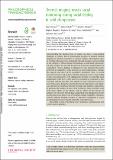Files in this item
Thermal imaging reveals social monitoring during social feeding in wild chimpanzees
Item metadata
| dc.contributor.author | Barrault, Claire | |
| dc.contributor.author | Soldati, Adrian | |
| dc.contributor.author | Hobaiter, Cat | |
| dc.contributor.author | Mugisha, Stephen | |
| dc.contributor.author | de Moor, Delphine | |
| dc.contributor.author | Zuberbühler, Klaus | |
| dc.contributor.author | Dezecache, Guillaume | |
| dc.date.accessioned | 2022-08-08T10:30:01Z | |
| dc.date.available | 2022-08-08T10:30:01Z | |
| dc.date.issued | 2022-09-26 | |
| dc.identifier | 280080879 | |
| dc.identifier | edead738-eca2-4610-8027-535fe15d6661 | |
| dc.identifier | 35934961 | |
| dc.identifier | 85135551842 | |
| dc.identifier | 000838044800004 | |
| dc.identifier.citation | Barrault , C , Soldati , A , Hobaiter , C , Mugisha , S , de Moor , D , Zuberbühler , K & Dezecache , G 2022 , ' Thermal imaging reveals social monitoring during social feeding in wild chimpanzees ' , Philosophical Transactions of the Royal Society B: Biological Sciences , vol. 377 , no. 1860 , 20210302 . https://doi.org/10.1098/rstb.2021.0302 | en |
| dc.identifier.issn | 0962-8436 | |
| dc.identifier.other | ORCID: /0000-0001-8378-088X/work/117210970 | |
| dc.identifier.other | ORCID: /0000-0002-3893-0524/work/117210980 | |
| dc.identifier.uri | https://hdl.handle.net/10023/25791 | |
| dc.description | The study was funded by the Swiss National Science Foundation (project no. 310030_143359 and NCCR Evolving Language to K.Z.), the ‘Fonds des donations’ from the University of Neuchâtel (awarded to C.B.), the European Union's 8th Framework Programme, Horizon 2020, under grant agreement no 802719 (awarded to C.H.), and the Swiss universities and St Leonard College mobility grants (awarded to A.S.). G.D. is indebted to the French government IDEX-ISITE initiative 16-IDEX-0001 (CAP 20-25) for funding. | en |
| dc.description.abstract | Understanding the affective lives of animals has been a long-standing challenge in science. Recent technological progress in infrared thermal imaging has enabled researchers to monitor animals' physiological states in real-time when exposed to ecologically relevant situations, such as feeding in the company of others. During social feeding, an individual's physiological states are likely to vary with the nature of the resource and perceptions of competition. Previous findings in chimpanzees have indicated that events perceived as competitive cause decreases in nasal temperatures, whereas the opposite was observed for cooperative interactions. Here, we tested how food resources and audience structure impacted on how social feeding events were perceived by wild chimpanzees. Overall, we found that nasal temperatures were lower when meat was consumed as compared to figs, consistent with the idea that social feeding on more contested resources is perceived as more dangerous and stressful. Nasal temperatures were significant affected by interactions between food type and audience composition, in particular the number of males, their dominance status, and their social bond status relative to the subject, while no effects for the presence of females were observed. Our findings suggest that male chimpanzees closely monitor and assess their social environment during competitive situations, and that infrared imaging provides an important complement to access psychological processes beyond observable social behaviours. | |
| dc.format.extent | 9 | |
| dc.format.extent | 664491 | |
| dc.language.iso | eng | |
| dc.relation.ispartof | Philosophical Transactions of the Royal Society B: Biological Sciences | en |
| dc.subject | Audience effects | en |
| dc.subject | Social ecology | en |
| dc.subject | Skin temperature | en |
| dc.subject | Social cognition | en |
| dc.subject | Pan troglodytes | en |
| dc.subject | QL Zoology | en |
| dc.subject | DAS | en |
| dc.subject.lcc | QL | en |
| dc.title | Thermal imaging reveals social monitoring during social feeding in wild chimpanzees | en |
| dc.type | Journal article | en |
| dc.contributor.sponsor | European Research Council | en |
| dc.contributor.institution | University of St Andrews. School of Psychology and Neuroscience | en |
| dc.contributor.institution | University of St Andrews. Centre for Social Learning & Cognitive Evolution | en |
| dc.contributor.institution | University of St Andrews. Institute of Behavioural and Neural Sciences | en |
| dc.identifier.doi | https://doi.org/10.1098/rstb.2021.0302 | |
| dc.description.status | Peer reviewed | en |
| dc.identifier.grantnumber | 802719 | en |
This item appears in the following Collection(s)
Items in the St Andrews Research Repository are protected by copyright, with all rights reserved, unless otherwise indicated.

